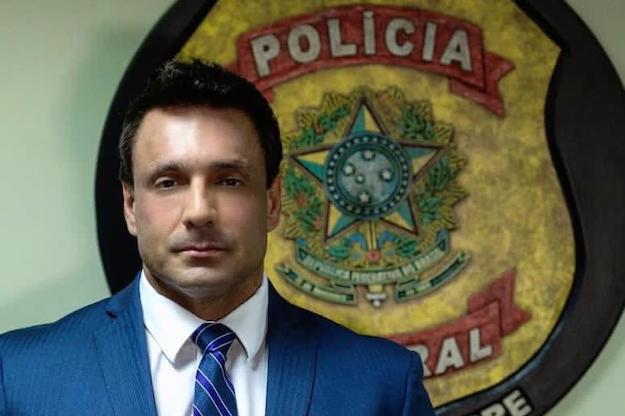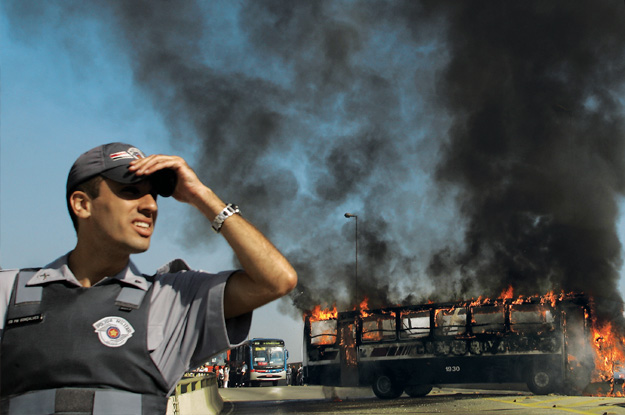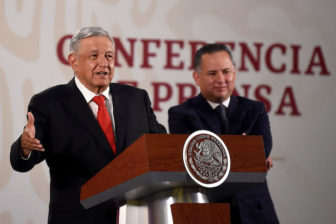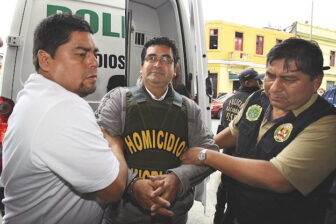This article is adapted from AQ’s special report on transnational organized crime | Ler em português | Leer en español
“Organized crime groups are for-profit business enterprises,” Elvis Secco said. “To combat them, we have to defund them.”
Before being appointed to lead the organized crime division at Brazil’s Federal Police in 2019, Secco gained national recognition for dismantling a money-laundering unit of Brazil’s largest criminal organization, the Primeiro Comando da Capital, or PCC. While authorities were busy looking for drugs, the PCC had been actively laundering money in Londrina, Paraná, a prosperous town of 600,000, for 10 years, unbothered.
Now, Secco is attacking money laundering by criminal organizations at a national level, a strategy that isn’t frequently seen in Latin America. Other organizations, including the UN, are eager to draw lessons from his unit’s work.

Americas Quarterly: You were chosen to lead the organized crime division because of your results in seizing assets, not drugs. Why did you pick that strategy?
Elvis Secco: I joined the Federal Police 25 years ago, and my inspiration came from my experience working as an agent. We would mount operations that uncovered large amounts of drugs. But I realized that only strengthened those groups, because we stopped at the base of the pyramid. In the meantime, the organizations were enhancing their money-laundering capabilities and working on their international links — be it in producing countries like Bolivia, Colombia, Peru, or where the buyers are: Asia, Europe, the United States and Africa.
I have a degree in economics, I understand market forces. Criminals are in this business for profit, so the only way to stop them is to decapitalize them. But there wasn’t a national directive in the Federal Police to investigate money laundering related to organized crime in the way we did for corruption cases. When I was promoted to commissioner, I started to focus my operations on money-laundering schemes.
The goal is to locate the financial center of an organization, weaken the leaders and reach the top of the hierarchy, identifying also the people working for them. We investigate to pinpoint the financial centers, often operated by people who have no criminal background — and then reach the leaders.
AQ: What triggered your first money laundering investigation?
ES: Ostentation is a very good lead. When I was first appointed head of the Londrina office, there were these families in town that drove $100,000 cars, traded them for a newer model every few months, lived in mansions and were always around the local elites. Who were they? We started checking the deeds and car registrations. That is when we found out that their luxury vehicles — dozens of them — were registered to people living in other states, some of whom were workers making minimum wage. The mansions, too, were registered to multiple people with no clear source of income. That was enough to launch a formal investigation. What we found was a sophisticated money-laundering scheme, with investments in gas stations, transportation companies, real estate and luxury assets.
For more than 10 years that group had laundered money without any interference. And if that was one cell, just imagine what the organization had across the country. The reality is that organized crime has infiltrated the elites and are enjoying a rich lifestyle. These are businesspeople, many of them lawyers, entrepreneurs, accountants. The level to which organized crime has integrated itself within our society is really dangerous.
AQ: How sophisticated are the money-laundering schemes that you have uncovered?
ES: They are laundering money all over the world. It is exactly the same process used by corrupt politicians and their corruptors: They use doleiros (black-market foreign exchange dealers) and offshore accounts, multiple shell companies and cash businesses. They use all sorts of businesses that can allow them to launder money.
A gas station, for example, will handle maybe up to 30% of its revenue in cash. In one operation in São Paulo, they had gas stations where 60% of the deposits were in cash. That group had a structure of about 70 businesses where the legal and illegal components were hard to differentiate. They also aggressively expanded abroad. Of some recent PCC leaders arrested, one was the owner of an export-import business in Mozambique, another had businesses in Italy.
After a few years, as these businesses start to have real revenues, it is much harder to investigate and prosecute them. And what stops them, then, from legally financing political campaigns? Participating in public bids? Nothing. They can then launder money through public works, laughing at us.
In 2020, in what we dubbed Operation King of Crime, we investigated and served warrants on a ring that had moved about $5 billion over four years. In that one operation we seized close to $100 million in assets, including helicopters, boats, cars and properties.
The only way to dismantle criminal organizations is to defund them. And to effectively decapitalize them we need to break their laundering operation. Besides depriving them of the possessions, when you prosecute for money laundering you can compile jail sentences for each asset seized — this way even if they are able to strike down a sentence for trafficking, they still have multiple other charges to keep them in jail.
AQ: Are Brazilian criminal groups focused only on drug trafficking?
ES: The large organized crime groups work in other areas as well, like illegal mining or human trafficking, which also help them launder money. But nothing is more lucrative than cocaine.
AQ: Are they moving to digital laundering options like cryptocurrencies?
ES: They are definitely using them, and we are getting better at investigating and trailing this. But their favorite scheme is still to have multiple small companies. And they are very organized. There are members in charge solely of the finances, who never deal with drugs or weapons.
So we changed the paradigm at the Federal Police. They do this for money, so let’s take the money away from them. The vision is to combat organized crime from a capitalist point of view, always looking to weaken their financial power.
But for this to work, international collaboration is key. We work with the U.S. DEA, but few countries have this focus on the money when it comes to organized crime. We need to change that. The UN Office on Drugs and Crime wants to use our example to get other countries to follow this model. These are global operations and we can’t just investigate locally.









